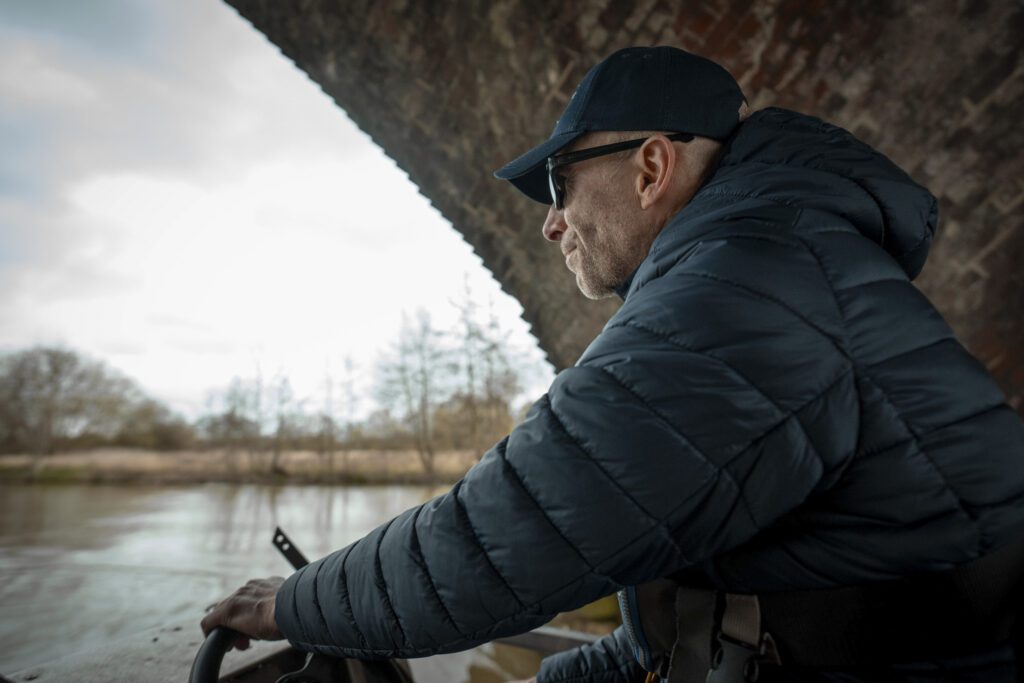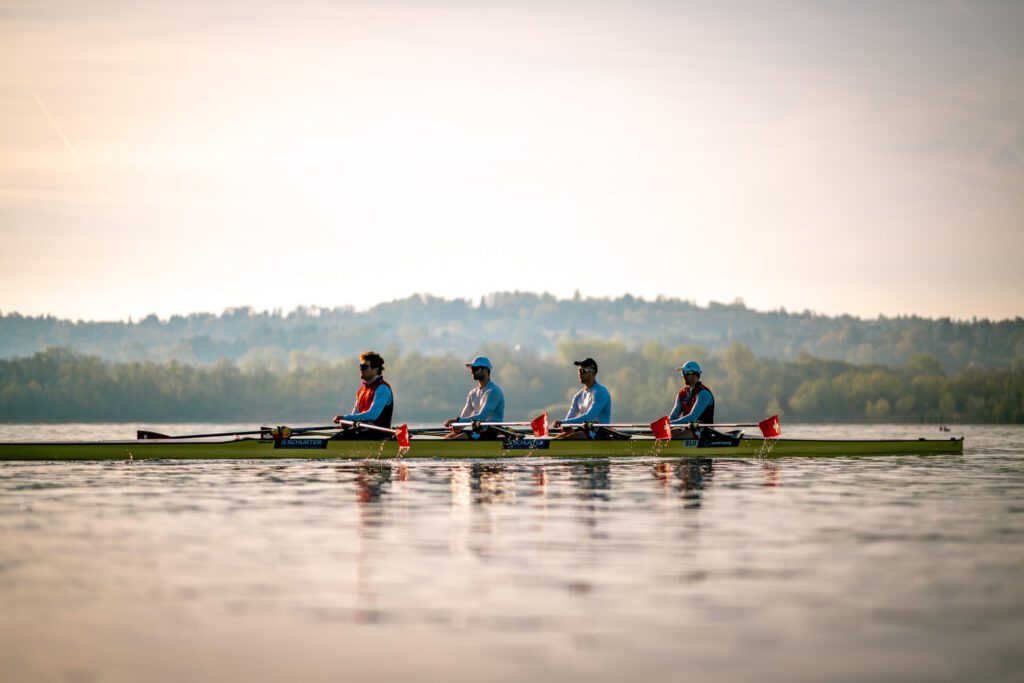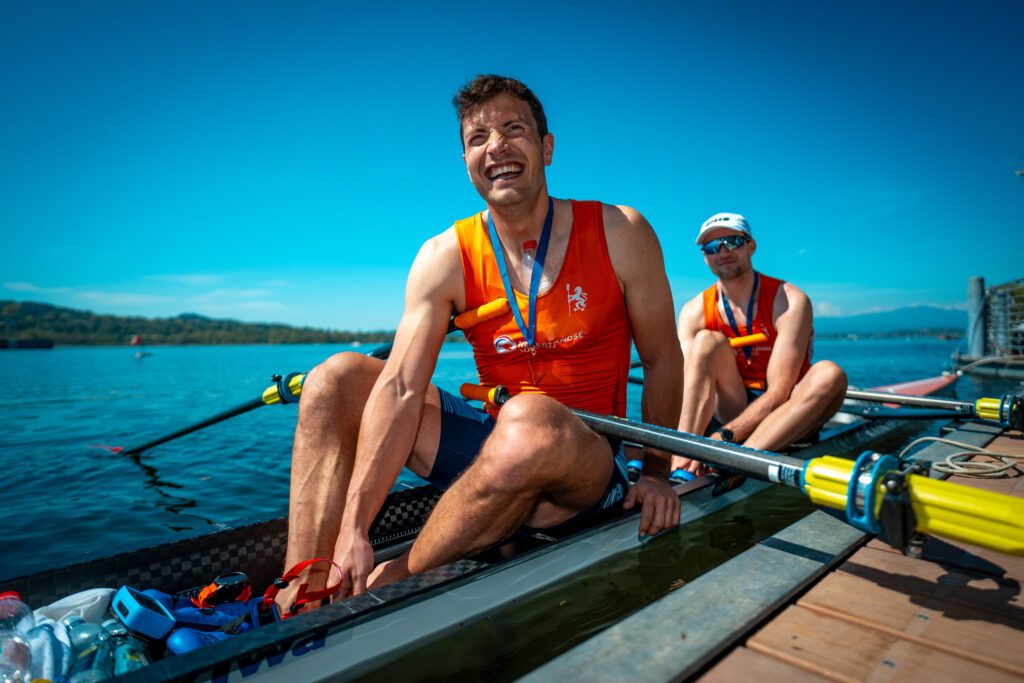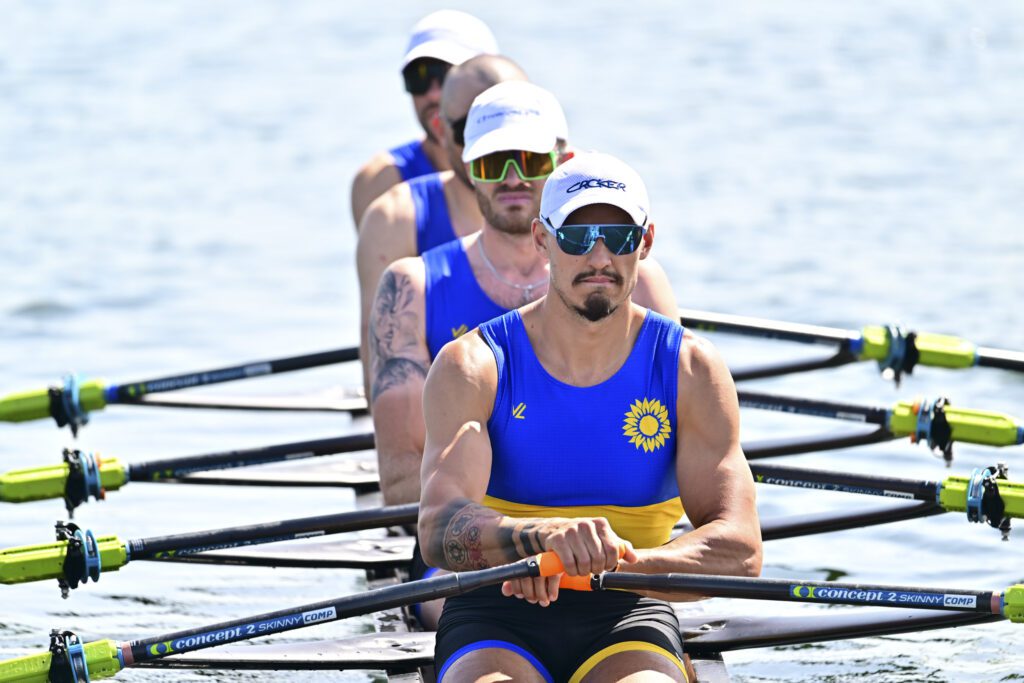On Sunday 1st September the sun set on Tokyo qualification and 86 shiny medals, and as it dropped below the trees beside the Ottensheim course, it set on a superbly run championships (from the athlete point of view) which had achieved all its aims with the minimum of fuss. As cables were being cut and banners taken down, two crews from a local club came out to paddle on the silenced lake, reclaiming their water after being booted off it for the best part of a fortnight. Last to leave the course were the New Zealand team, noisily celebrating a largely successful weekend finishing top of the medal table with four golds and two silvers, all Olympic class.
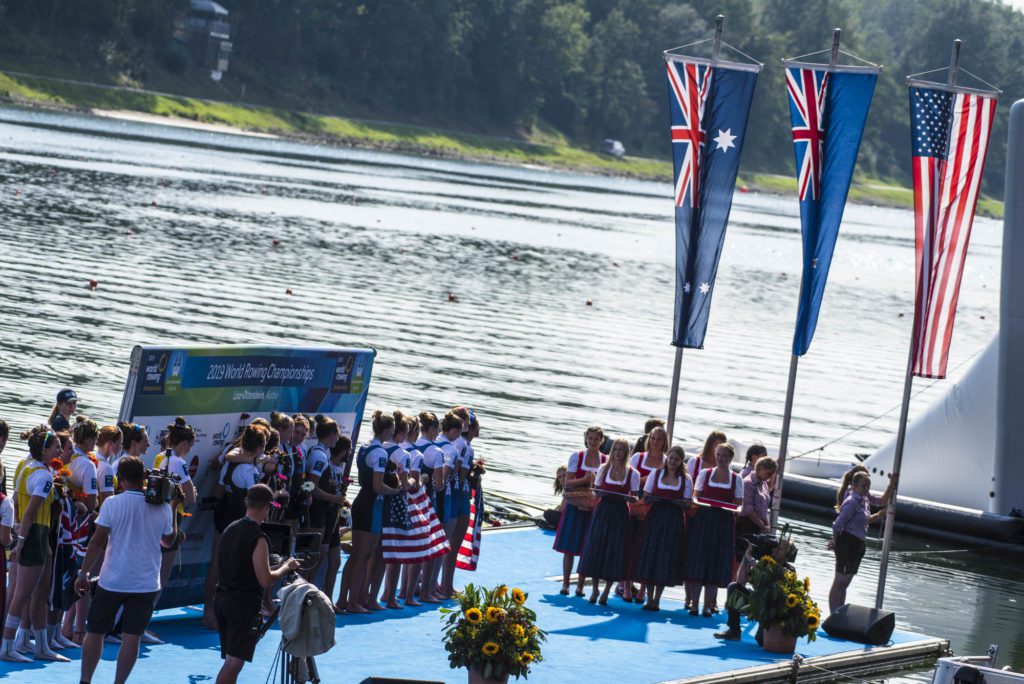
Photo NZL win W8+ and top the medal table // World Championships, Linz Ottensheim, Austria. Sunday 1 September 2019
Credit Benedict Tufnell
How do you measure success? Is it number of medals, type of medals, the number of Tokyo tickets or the performance of Belgium’s LM2x Tim Brys and Niels van Zanderweghe, their nation’s sole crew at the championships who secured Olympic qualification for seats they will surely fill in person? The favourite phrase of the week was “it’s all about Tokyo” and yet Britain, equalling the Netherlands with 10 Olympic crew places but leaving with only three bronze medals in those ten events, know they have a mountain to climb in 2020.
New Zealand should have no cause to be envious of the Brits, adding nine Tokyo slots to their medal haul, but after a disastrous men’s squad performance they have only five seats heading to Japan, and lack the one they really wanted, the New Zealand men’s eight. That will smart, and the country which won four gold medals in an hour in 2005 now has a sole pair in their men’s sweep squad while the women have ten seats and also a full sculling set.
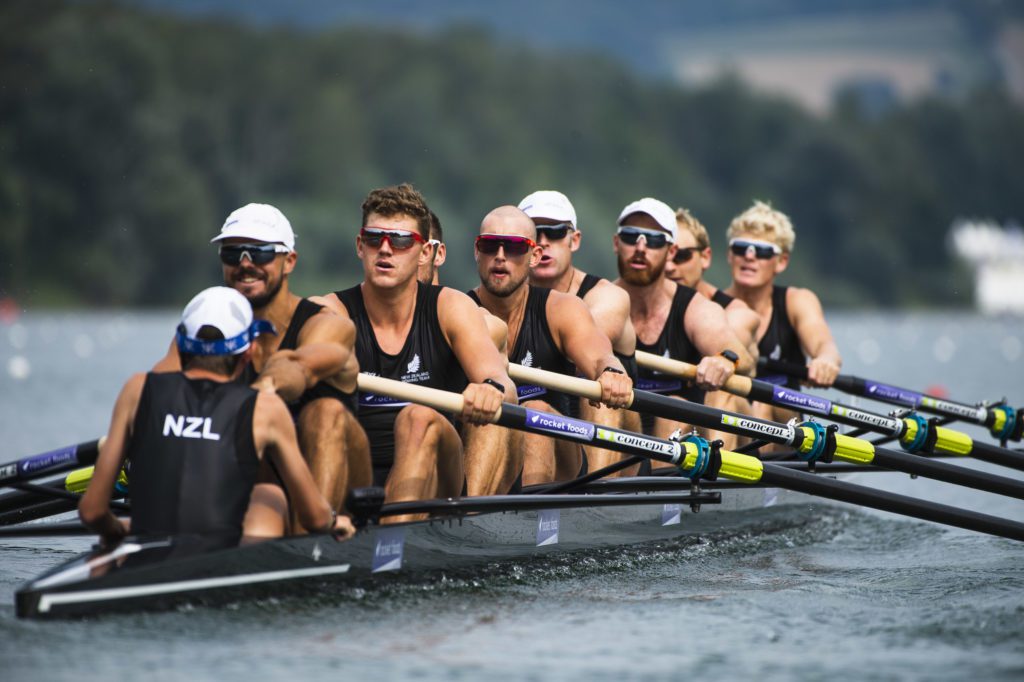
Photo The NZL M8+ // World Championships, Linz Ottensheim, Austria. Sunday 1 September 2019
Credit Benedict Tufnell
Superstars Mahe Drysdale and Hamish Bond are considering their future, and Drysdale already told NZ television on Sunday that he intended to bid for the single, qualified here by the hapless Robbie Manson, who could well end up back in the double. But the more likely single is Bond, if he remains in training and wants to scull: unlike Drysdale he has been a full-time athlete since Rio and this is the man who is looking for new challenges and beat Drysdale in a fair fight at the Kiwi national championships while supposedly focusing on being world champion in the pairs. [He also never competed in a repechage until this week, an extraordinary feat in the current era.] It will be up to the NZ selectors, who may feel that Bond would have a chance of beating the Sinkovics in a pair, leaving Drysdale and Manson to fight it out for the solo boat — if Manson stays in the game. He has been hinting on social media that he wants to take stock which may mean a serious think about what, if anything, he wants to do about Tokyo.
Let’s dig into the magnificent eights races, and start with a new chapter of history being written by the Kiwi oarswomen, who claimed the first ever world W8+ title, their coxswain Caleb Shepherd incidentally becoming the first man to win a women’s FISA gold medal and rowers Grace Prendergast and Kerri Gowler crowned double world champions. New Zealand comprehensively duffed up reigning champions USA, holding their start while the Australians burst off the blocks, and then passing them with a sustained 650m push which inched them through the US, closed on Australia and eventually took the lead.
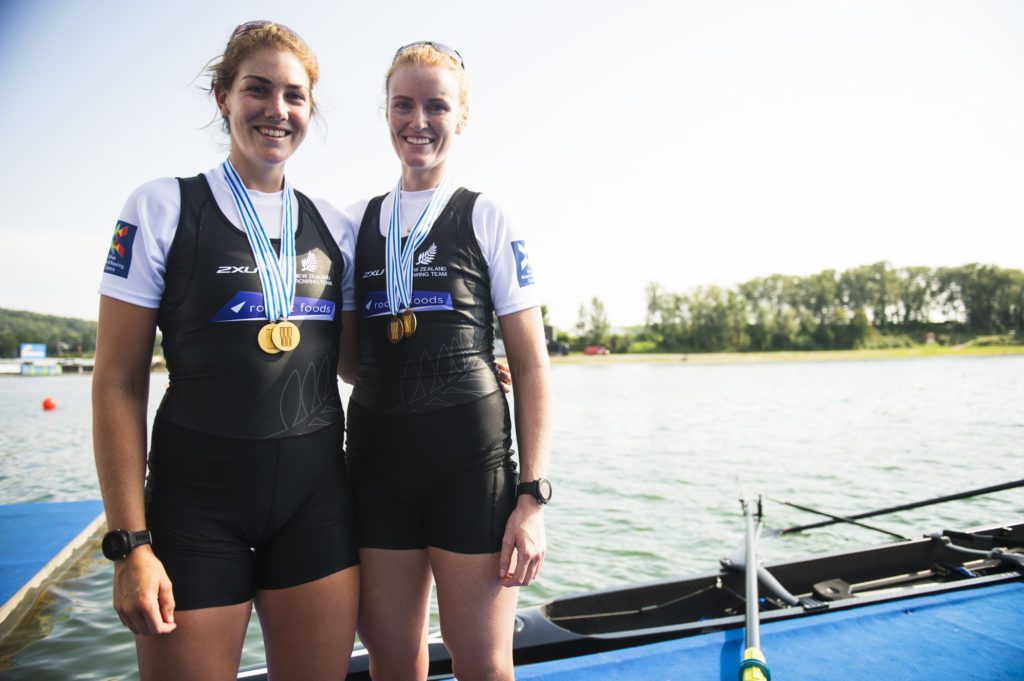
Photo Grace Prendergast and Kerri Gowler crowned double world Champions // World Championships, Linz Ottensheim, Austria. Sunday 1 September 2019
Credit Benedict Tufnell
Jackie Gowler, sister of Kerri, kept her crew at 43 from 200m to go and had it not been for the head-wind, New Zealand might well have challenged the world best time, which they missed by only 2.7 seconds. The USA had to work like stink to stay ahead of Canada for bronze but were more than a second down on Australia. Gowler, speaking to Row360 after the race, looked surprised at the idea that they might double up in Tokyo, but it’s a far from silly idea. They clearly supercharge the eight, weathered this week very well and would not face quarterfinals at the Olympics. Romania, by the way, were the W8+ who missed qualification, languishing in last place all the way through well behind a clearly relieved Britain.
Germany commemorated their late crewmate Maximilian Reinelt, lost to sudden cardiac arrest at the far too young age of 30 in February, in the best possible way with a clean and powerful victory to defend their 2017 and 2018 titles. After the race it was impossible to get near them through the scrum of eager German journalists but I’d bet they had a push for Max as they broke clear of the pack. The script had not changed: Germany weathering the storm of the start and then squeezing on to take a stronger lead which they could develop into a win. This time the Dutch, on song after their men’s quads gold the day before, mounted their own challenge and started dogging the Germans’ heels, pushing back every time Germany took a few more feet. The last 500m was all-out war, Germany throwing the kitchen sink at it to stay more than half a length ahead of the Dutch while the British pulled ahead of the pack for bronze and New Zealand stuttered to non-qualifying sixth behind Australia and the USA.
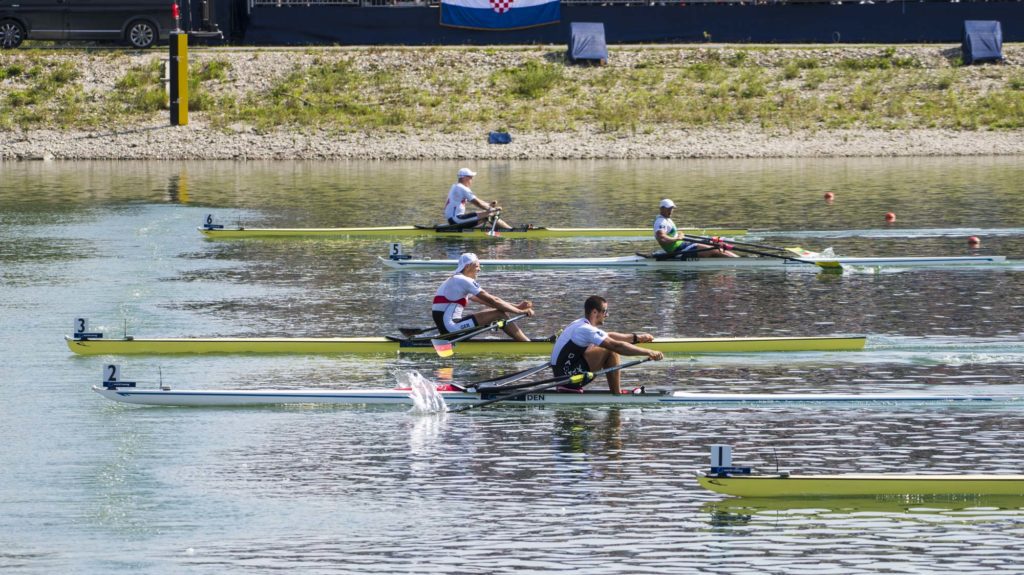
Photo Oli Zeidler wins an extremely close M1x final // World Championships, Linz Ottensheim, Austria. Sunday 1 September 2019
Credit Benedict Tufnell
The great promise of Oli Zeidler was fulfilled in a tremendous singles race which gave Germany their second gold, and would have defied belief had we not already seen the Rio 2016 M1x final. A first thousand during which only Ondrej Synek (CZE) and Mindaugas Griskonis (LTU) were slightly dropped was followed by the race re-setting itself and starting again, the only question being who had more lactate in their legs.
Dutchman Stef Broenink peeped into the lead for several hundred metres but that wasn’t going to last with the big guns of Sverri Nielsen (DEN), Zeidler and Kjetil Borch (NOR) starting to fire. Coming to the grandstands it was as if the previous 1900m had never happened, with five scullers abreast for the medals. One of the closest fields in M1x history, and it finished in a rush with Borch third, and a Zeidler/Nielsen photofinish for gold won by the German. The athletes came off the water in a daze, Zeidler unable to stand up for several minutes and Sverri uncertain who had won. If this is what Olympic-level sculling is coming to, give us more.
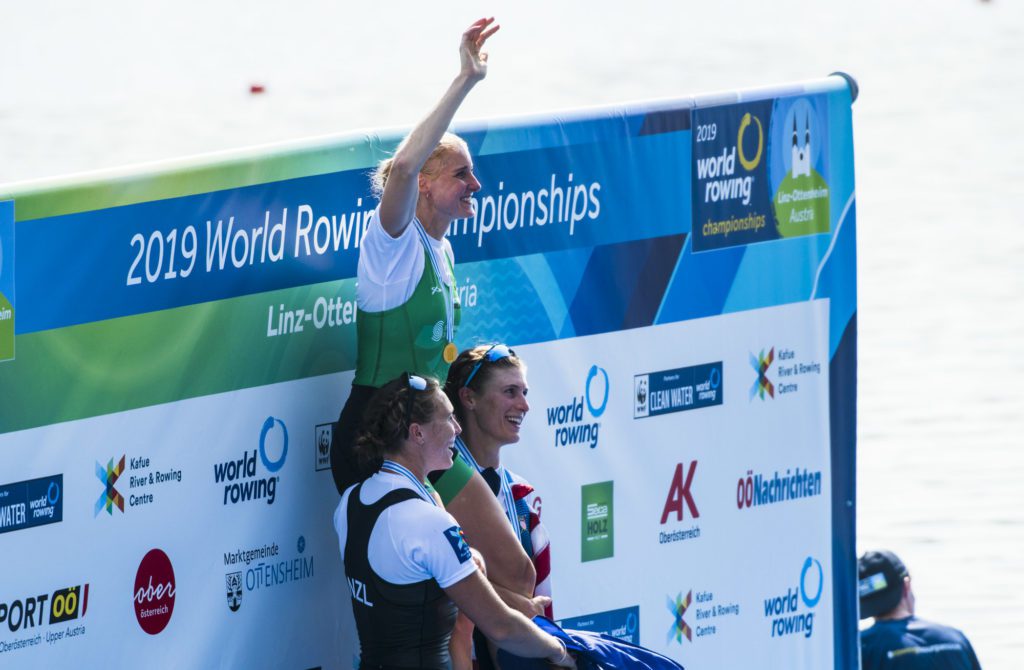
Photo Sanita Puspure, Emma Twigg and Kara Kohler on the W1x podium // World Championships, Linz Ottensheim, Austria. Sunday 1 September 2019
Credit Benedict Tufnell
And we got it: by comparison with the men the earlier W1x final might have seemed less thrilling, were it not for Emma Twigg (NZL), who decided to be brave and take the fight to reigning world champion Sanita Puspure (IRL). She steadily forged a lead of a full length over Puspure, and given the Kiwi oarswoman’s phenomenal ability to sustain effort without flagging, it was a gamble which might have paid off were it not for the Irishwoman’s physiology and sheer speed. The fight-back began at about 1350m gone, and Puspure’s push chewed chunks out of Twigg for two full minutes, taking the champion into the lead. Twigg, a returner to the sport only this season after a 2-year gap, could not repel the attack and focused on stopping US sculler Kara Kohler getting close enough for more than bronze, but it will be interesting to see what one more year of training could do for the New Zealander.
The women’s para-singles were a less tumultuous affair, Norwegian Birgit Skarstein winning five seconds outside her own world best time to take her record to three out of three for this Paralympiad, albeit pressed harder than ever before by the clearly improving Nathalie Benoit of France. But the men’s para-singles was a belter. A summary would be that Paralympic champion Roman Polianskyi (UKR) took world champion Erik Horrie (AUS) to the cleaners while Alexey Chuvashev (RUS) capitalised on the confusion to take silver and Brit Benjamin Pritchard grabbed the “best newcomer” award by finishing only two seconds off Horrie’s bronze. Polianskyi is romping freely at the top of the singles list at the moment, but note that Horrie had an injury earlier in the year, and would normally dispose of Chuvashev quickly. He has a year to plot revenge while all of them must wonder just how much faster Pritchard can go with another 12 months of training.
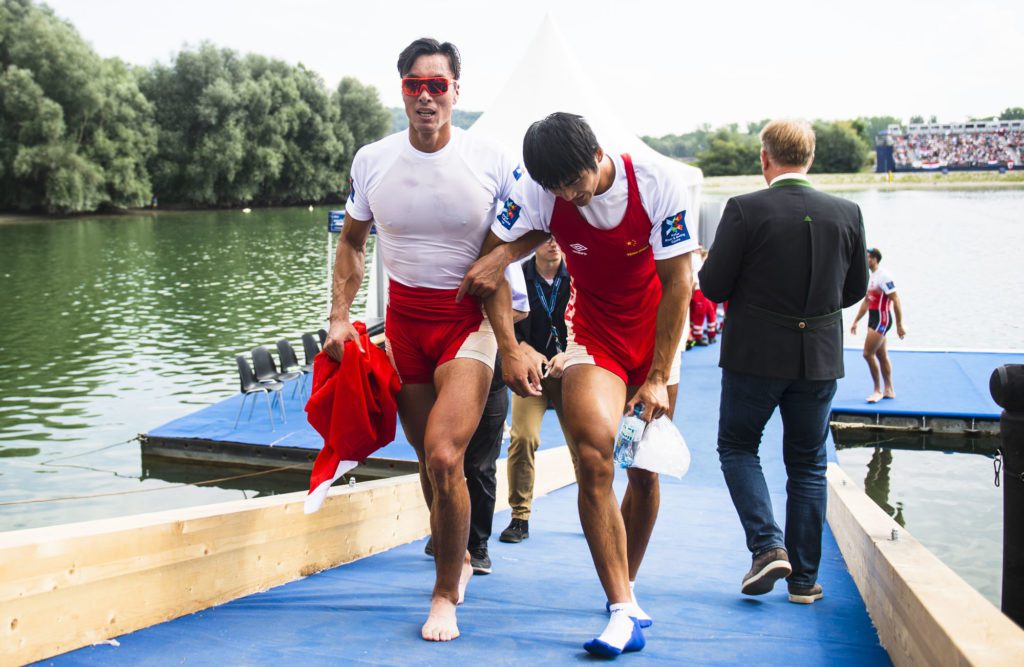
Photo Liu Zhiyu and Zhang Ling (CHN) win the M2x // World Championships, Linz Ottensheim, Austria. Sunday 1 September 2019
Credit Benedict Tufnell
Many bets would have been on the Irish double of Philip Doyle and Ronan Byrne to capture the men’s doubles title, but it was the other semi-final winners China who proved too fast for them. Liu Zhiyu and Zhang Liang led very early on, and although the Irish clawed back to a few feet margin by the end, it looked as if the Chinese would always have had another gear. The Irish push, which sent Poland to third place, pulled the top part of the race away from Britain, Switzerland and Romania, even though all three had been close to the action at different points.
The women’s doubles final was fascinating, only France dropping back after early speed. The first half of the race was dominated by initially Canada and then the USA, both doubles on a mission to prove their speed, but it was not going to stay that way for long. As the crews moved away from the thousand-metre mark, former world champions Brooke Donaghue and Olivia Loe started their charge, and ground their way through from third place, passing the Canadians and attacking the USA. Although Cicely Madden and Gevvie Stone (USA) resisted for a while, this time the Kiwis were not to be denied and grabbed the lead moments before 500m to go, then turned the screw again. Behind them Roos de Jong and Lisa Scheenaard (NED) were creeping up on the outside, but they were then overtaken by a superb charge from under-23 Romanians Nicoleta-Ancuta Bodnar and Simona Geanina Radis (ROU) who closed remarkably hard on the Kiwis and threw rate at the problem, to grab the silver. Bronze went to the Dutch by half a second over the Canadians, who just couldn’t cope with the speed of the final rush but did manage to hold off the Yanks.
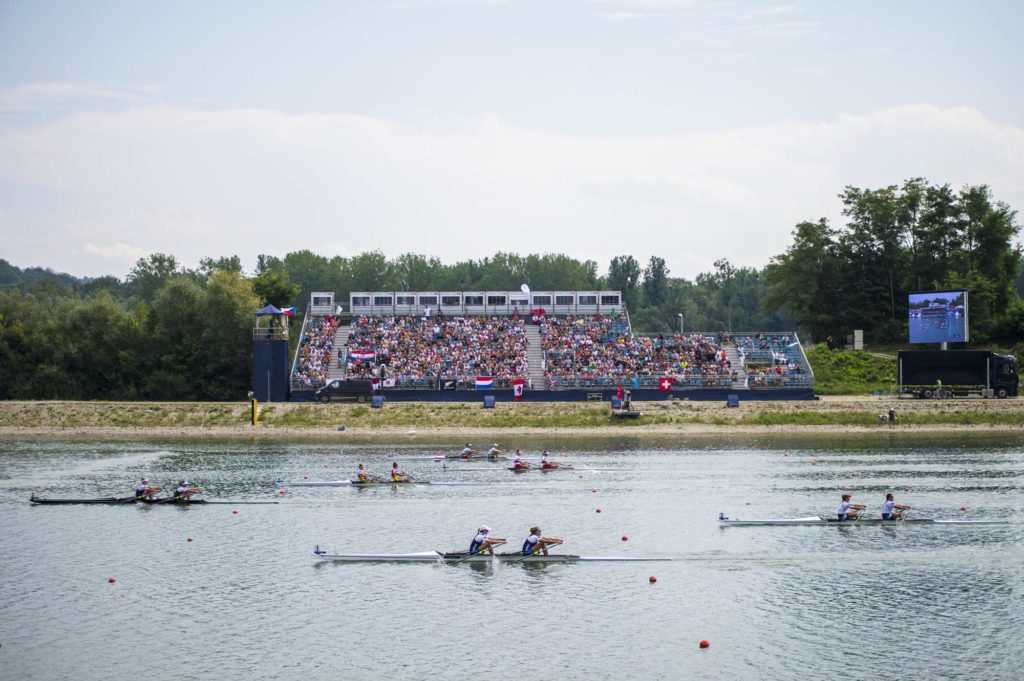
Photo W2x final // World Championships, Linz Ottensheim, Austria. Sunday 1 September 2019
Credit Benedict Tufnell
In all the excitement of afternoon A-finals it was easy to forget the drama of the B-finals earlier, in which variously 7th, 9th or 11th place was greeted with as much unadulterated delight as a gold medal. There was agony for former Paralympic silver medallist Lludmila Vauchok (BLR), missing the last para-singles qualifying spot behind Korean Sejeong Kim. And delight for the US’s Blake Haxton, confirming his quality by winning the men’s para-singles B-final after losing out in the semi. But the highlights were the two doubles B-finals, both unbelievably tight, bringing the crowds in the stands to their feet because they were contests you just had to witness standing. When last place is the only bad place, boy does it ratchet up the tension. If you get the chance, watch those again on the WorldRowing website.
The London Olympic 2012 champion Mirka Knapkova (CZE) and silver medallist Fie Udby Erichsen (DEN) were the ones to lose out in a W1x B-final which sent only three to Tokyo, Dutchwoman Laila Youssifou benefiting along with local heroine Magdalena Lobnig. And Robbie Manson (NZL) qualified a M1x place which he may well lose, along with Damir Martin (CRO) and the impressive Italian Simone Martini, just ahead of non-qualifier Natan Wegrzycki-Szymczyk (POL).
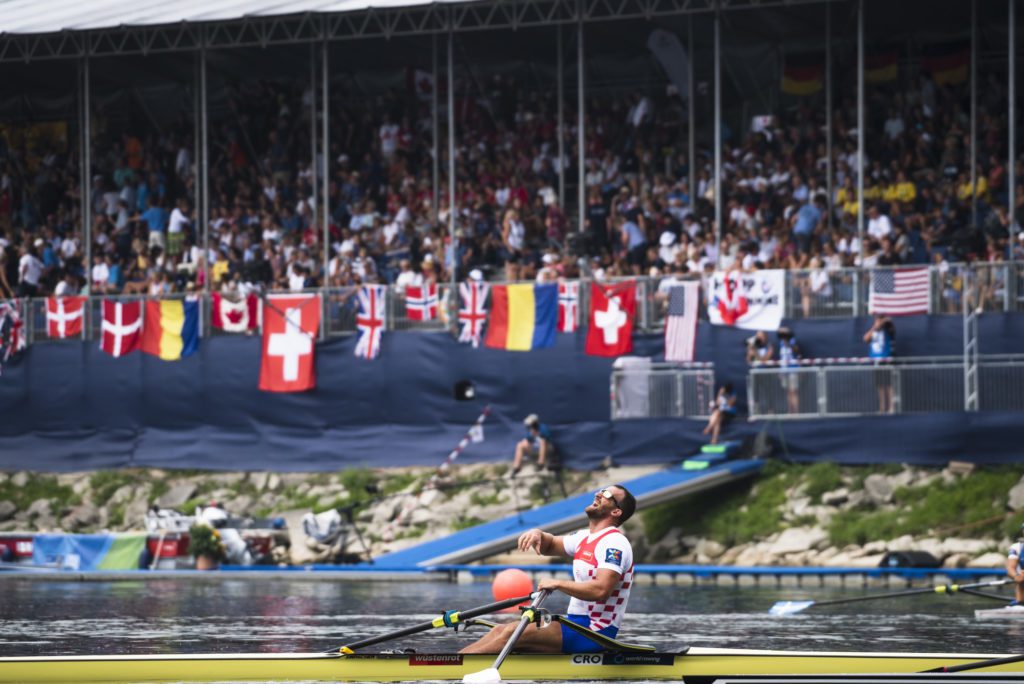
Photo Damir Martin (CRO) wins the M1x B final and books his place to Tokyo // World Championships, Linz Ottensheim, Austria. Sunday 1 September 2019
Credit Benedict Tufnell
The mood after the athletes leave and the trailers rumble away is usually sad, the sense of a void opening up where there had been emotion, ambition and action. But this time as the venue quietened there was, beside the fatigue, a shiver of anticipation – Linz was only the opening act and the real drama is about to begin. Take your places on the 2020 Tokyo Express, because the rollercoaster ride starts now.
